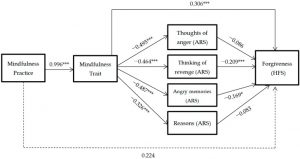Mindfulness is Associated with Forgiveness and Reduced Anger Rumination
By John M. de Castro, Ph.D.
“Forgiveness demands presence, reminding us that we are not the same as the feelings we possess in a given situation, nor is the person who we’ve harmed or who has harmed us.” – Sharon Salzberg.
Forgiveness is important to happiness and psychological well-being. It allows one to move beyond anger and resentment. It is an adaptive ability to move beyond a perceived transgression by another, not by ignoring or denying it, but by reframing it so the response moves away from negativity. This is true not only of others but also the self. Self-forgiveness is essential for psychological well-being. There is emerging research on forgiveness but much has yet to be explored regarding the processes that lead to and improve forgiveness. Mindfulness has been found to be associated with higher levels of forgiveness. So, it makes sense to explore the processes by which mindfulness is associated with forgiveness.
In today’s Research News article “Anger Rumination and Mindfulness: Mediating Effects on Forgiveness.” (See summary below or view the full text of the study at: https://www.ncbi.nlm.nih.gov/pmc/articles/PMC7967311/ ) de la Fuente-Anuncibay and colleagues recruited university students who practiced mindfulness informally and those who were naïve to mindfulness practice. They completed measures of mindfulness, forgiveness, including self-forgiveness, forgiveness towards others and situation-forgiveness subscales, and anger, including angry or rage memories, understanding the causes of the anger, thoughts after the anger and thoughts of revenge subscales.
They found that the students who practiced mindfulness had significantly higher levels of forgiveness that those who didn’t. Further they found that mindfulness was associated with higher levels of forgiveness directly and also indirectly by being associated with lower levels of anger rumination which was in turn were associated with smaller reductions in forgiveness. Further analysis using the anger rumination subscales revealed that mindfulness was associated with decreased levels of anger revenge as opposed to anger memories.
This study is correlational and as such causation cannot be determined. Nevertheless, the associations are clear. Mindful people are more forgiving than less mindful people, and they also have a lower need for revenge for transgressions This lower revenge is also associated with forgiveness. Future research should investigate the effects of mindfulness training on anger and forgiveness to determine causation.
The results demonstrate as has previous research, that mindful people are forgiving people. This makes them better at social interactions as they are less likely to hold grudges. But importantly mindful people are also self-forgiving. This is extremely important for the mental health of the individual. Everyone is imperfect and makes mistakes. If this can be realized and the imperfections forgiven mental well-being can be vastly improved. Hence, mindful forgiveness is an important contributor to the overall happiness and well-being of the individual.
So, mindfulness is associated with forgiveness and reduced anger rumination.
“the more you practice mindfulness, the more you strengthen your capacity for forgiveness.” – Stefanie Goldstein
CMCS – Center for Mindfulness and Contemplative Studies
This and other Contemplative Studies posts are also available on Google+ https://plus.google.com/106784388191201299496/posts and on Twitter @MindfulResearch
Study Summary
de la Fuente-Anuncibay, R., González-Barbadillo, Á., Ortega-Sánchez, D., Ordóñez-Camblor, N., & Pizarro-Ruiz, J. P. (2021). Anger Rumination and Mindfulness: Mediating Effects on Forgiveness. International Journal of Environmental Research and Public Health, 18(5), 2668. https://doi.org/10.3390/ijerph18052668
Abstract
(1) Background: Different investigations relate mindfulness practice as a strategy to cope with and improve negative repetitive thinking states and forgiveness. (2) Methods: The aim is to analyze the mediating processes of mindfulness as a trait and the changes in the anger rumination on forgiveness. This sample comprised 264 undergraduate students (M = 24.13 years, SD = 11.39). The instruments used were the Anger Rumination Scale (ARS), the Five Facet Mindfulness Questionnaire (FFMQ) and the Heartland Forgiveness Scale (HFS). For data analysis, the spillover effect was calculated using 10,000 bootstrap samples for the bootstrap confidence intervals (CI). (3) Conclusions: The results confirm that the relationship between mindfulness practice and forgiveness is mediated by changes in mindfulness trait and anger rumination. Given the results obtained, it is considered appropriate to extend the study to samples from other countries, as well as to contexts of depressive rumination or anxiety.
https://www.ncbi.nlm.nih.gov/pmc/articles/PMC7967311/
